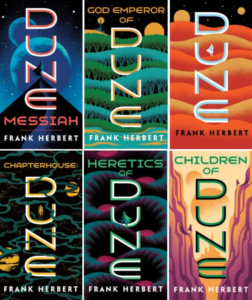Photo Courtesy of HBO Max
Author: Annie Hoang
Look, I’m not ashamed to admit that it didn’t take much to get me into the theatre to watch Dune. Slap Timothee Chalamet and Zendaya on a movie poster, and I immediately become another sucker in the theatre with a tub of popcorn and a bank account that’s fifteen dollars lighter. I didn’t even watch the trailer, let alone read the novel. Before you book lovers prosecute me for my discretion, please know that I tried. Someone’s had it checked out from the Lemeiux library for the past two months. Whoever you are, I expect you to take full responsibility, not only for your reading speed but for granting me the chance to experience Dune with an unfiltered perspective, which, in my opinion, is the best way to go into it. Thus, I present you with a (mostly) spoiler-free review in the hopes that you give it a chance.

Dune is the film adaptation of a novel of the same name, written by Frank Herbert. It tells the story of Paul Atriedes (Timothee Chalamet), the son of a duke (Oscar Issac) who was born with a powerful gift and the destiny to change the course of the universe. Interwoven within this classic hero’s journey is the extensive and intricate lore that can be found within the pages of Herbert’s novels, including secretive orders guiding cosmic fate, the clashing of aristocratic families, and themes of free will and fate.
Did I expect to enjoy two and a half hours of sandworms and space politics? No.
Then again, this past year has been full of things I didn’t expect to happen, and Dune‘s history is no less different. The novels have been adapted into a 1984 film and two miniseries, all of which never reached the same level of success, all of which never reached the same level of financial or story-telling success as the novels. On top of this disastrous track record, the film was directed by Denis Villeneuve, someone who, unfortunately, has a history of creating phenomenal first installments with sequels that never see the light of day.
Despite its double curse, Dune exceeds expectations and paves the way for the emergence of more artistic franchises.
From the unique costume designs to the depth of its visual effects, elevated by Villeneuve’s mastery of stunning shots, Dune succeeds in all the aspects that come together to make a film. Paired with an all-encompassing and mesmerizing score by Hans Zimmer, it’s no wonder that I found myself transported into an entirely new universe. It’s easy to tell that Dune‘s potential for success is attributed to Villeneuve’s attention to detail and passion for not only making a fantastic film but one that does Herbert’s series justice. Because of this devotion, he isn’t hesitant in taking the huge risk of creating a piece of a larger story rather than give audiences the expected beginning, middle, and end arc. It’s not the type of film that audiences are used to, but it still manages to avoid being so convoluted that it becomes inaccessible. Unlike the superhero films gracing our screens every month, Dune doesn’t baby its audience. It allows us to sit in the unknown, and the confusion feels like a welcome challenge rather than a barrier to understanding its world. I left the theatre wanting more and feeling conflicted about googling any of my questions, lest I spoil myself for the sequel. Furthermore, Dune doesn’t depend on the novel’s fans to tell a whole and meaningful story. If you need to read the book in order to understand its film adaptation, then it isn’t a good adaptation.

Some may feel unsatisfied with Dune’s story arc. It is, in fact, only an adaptation of the first part of the first novel in a series of six. However, I would caution anyone from calling it a waste of time. I believe that Villenueve has set up a world with endless possibilities, one with a talented cast that has the acting chops to deliver the perfect blend of drama and sci-fi. As an avid fan of superhero films, I often find myself disappointed in the lack of depth within these worlds. Dune could be the first of many installments that elevates the standard of storytelling for franchises. That’s not to say Dune is without its faults. Although it’s an impressive piece of intricate storytelling and skillful world-building, the film, like many others of its genre, begs the question of whether we truly need another story centered on a white man destined to be the savior of the universe.
However, that’s a whole other can of worms (haha, get it?). Thus, I end my review with this final point: It was a travesty that Zendaya had less than ten minutes of screentime.
ANNIE HOANG | More Zendaya and less sand, please. | KXSU Arts and Music Reporter

